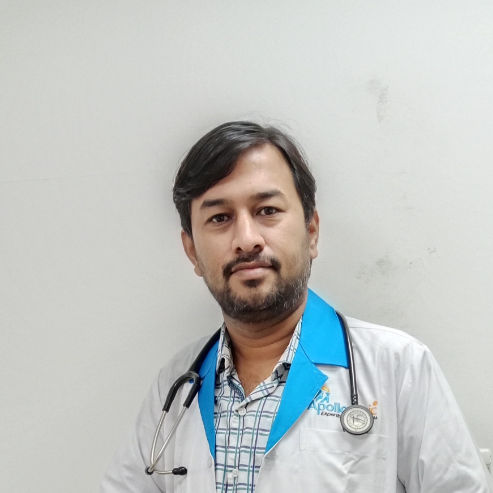Welcome User
Relevance
Consult Haematology Doctors Online - Haematologists (30 doctors)

Dr.sanchayan Mandal
Oncologist
17 Years • MBBS, DrNB( MEDICAL ONCOLOGY), DNB (RADIOTHERAPY),ECMO. PDCR. ASCO
Kolkata
Dr. Sanchayan Mandal Oncology Clinic, Kolkata

Dr. Sonal Paul
Haematologist
9 Years • MBBS, MD Pathology, DM Clinical Haematology
Kolkata
SATKRIT HEALTHCARE - A MULTISPECIALITY CLINIC, Kolkata

Dr Ankit Kumar
Haematologist
8 Years • MBBS, MD(Pathology), DM (Clinical Haematology)
Delhi
Dermhaem Clinic, Delhi

Dr Abilash Jain
General Physician/ Internal Medicine Specialist
12 Years • MBBS,DNB(FM),MNAMS,FIAMS,CCGMG(GERIATRICS),DGM (GERIATRICS),PGCD(DIABETES,BOSTON UNIVERSITY),FID(DIABETICS UK)CCEPC(PALLIATIVE CARE),CCCC(CRITICAL CARE)
Visakhapatnam
Apollo Clinic Vizag, Visakhapatnam

Dr. Thorana Prakash M
General Physician
2 Years • MBBS
Bengaluru
PRESTIGE SHANTHINIKETAN - SOCIETY CLINIC, Bengaluru
Dr Sumanth R
General Physician
2 Years • MBBS
Bengaluru
PRESTIGE SHANTHINIKETAN - SOCIETY CLINIC, Bengaluru

Dr. Ramalinga Reddy
General Physician
5 Years • MBBS MD General medicine
Bengaluru
PRESTIGE SHANTHINIKETAN - SOCIETY CLINIC, Bengaluru

Dr. E Prabhakar Sastry
General Physician/ Internal Medicine Specialist
40 Years • MD(Internal Medicine)
Manikonda Jagir
Apollo Clinic, Manikonda, Manikonda Jagir
(125+ Patients)

Dr. Sushith C
General Physician
2 Years • MBBS
Bengaluru
PRESTIGE SHANTHINIKETAN - SOCIETY CLINIC, Bengaluru

Dr. Prabu P
Haematologist
29 Years • MBBS, MD(Gen.Med.)(JIPMER) , MRCP, Dip RCPath, FRCPath, CCT(U.K), Haemato - Oncology.
Chennai
Apollo Hospitals Greams Road, Chennai
(500+ Patients)
Dr. Madhupriya B
Haematologist
7 Years • MBBS,MD, DrNB CLINICAL HAEMATOLOGY AND BONE MARROW TRANSPLANT.
Bengaluru
Apollo Hospitals Jayanagar, Bengaluru

Dr Srikanth M
Haematologist
30 Years • MD,MRCP,FRCPath,dip.RCPath,CCT,Heam.
Chennai
Apollo Hospitals Cancer Centre Nandanam, Chennai
(50+ Patients)

Dr. Srikanth M
Haematologist
25 Years • MD, MRCP, FRCPath, Dip. RCPath, CCT, Heam.
Chennai
Apollo Hospitals Greams Road, Chennai
(150+ Patients)

Dr Lakshmi Mythili Mulam
Haematologist
5 Years • MD, DNB
Chinagadila
Apollo Hospitals Health City Unit, Chinagadila
Dr. Sasikamalam
General Practitioner
1 Years • MBBS
COIMBATORE
Apollo Sugar Clinic Coimbatore, COIMBATORE
Haematology
Booking an appointment with top haematologists is now easier than ever with Apollo 24|7. Our expert team of haematology specialists is dedicated to providing the best care for blood-related disorders. Whether you prefer an online consultation or a visit to one of our trusted hospitals or clinics, we offer convenient appointment slots that fit your schedule. With Apollo 24|7, you can access the expertise of the best haematologists in India and receive personalised treatment plans tailored to your specific needs. Take the first step towards better health and book your appointment with a haematologist today.
What is Haematology?
Haematology is a branch of medicine concerned with the study of blood, blood-forming organs, and blood diseases. This speciality focuses on the diagnosis, treatment, and prevention of diseases related to the blood, such as anaemia, haemophilia, blood clots, and leukaemia.
Haematologists explore how blood cells behave and how the clotting processes work, making haematology vital for understanding many pathological and physiological processes in the body.
The relevance of haematology in healthcare is profound, as it underpins crucial aspects of both diagnostic procedures and therapeutic interventions, ensuring the maintenance of blood health which is essential for overall bodily function.
Who is a Haematologist?
A haematologist is a medical doctor who specialises in diagnosing and treating disorders of the blood, bone marrow, and vascular systems. To become a haematologist, a candidate must complete medical school followed by several years of further training in haematology, often including a combination of research, teaching, and clinical practice.
These specialists possess comprehensive expertise in managing conditions such as sickle cell disease, lymphoma, and myeloma.
Haematologists play a critical role in both clinical and laboratory settings, where they develop and administer treatment plans and may also engage in pioneering research to discover new therapies for blood-related diseases.
What Does a Haematologist Do?
A haematologist’s key responsibilities encompass a broad range of clinical and laboratory duties that directly impact patient care.
Clinical Consultations: Haematologists regularly meet with patients to diagnose blood disorders and blood-related conditions. These consultations involve discussing symptoms, reviewing medical histories, and planning treatment strategies.
Diagnostic Testing: One of the primary duties of a haematologist is to perform and interpret various blood tests. These tests help in diagnosing conditions like anaemia, clotting disorders, and blood cancers.
Treatment Management: Haematologists develop and oversee treatment plans for their patients. This may include prescribing medication, managing blood transfusions, and coordinating with other specialists for comprehensive care.
Patient Monitoring: Ongoing monitoring of patients with chronic blood diseases is vital. Haematologists track the progress of treatments and adjust them as necessary to achieve the best outcomes.
Research and Development: Many haematologists are also involved in research, looking for new insights into blood disorders and improvements in treatment methods. This aspect of their work ensures that care practices evolve and improve over time.
Education and Training: As experts in their field, haematologists often have responsibilities for training medical students, residents, and new healthcare staff, ensuring that knowledge about blood health is passed on and maintained to high standards.
In their daily activities, haematologists provide a type of care that is both intensive and specialised, making them indispensable in the management of diseases that affect the blood and its components.
What are the Other Sub-specialities of Haematology?
Haematology encompasses a range of sub-specialities, each focusing on different aspects of blood health and treatment. Understanding these areas can help you identify the right haematology specialist for specific conditions:
Clinical Haematology: This sub-speciality deals with the diagnosis, treatment, and prevention of blood diseases and disorders. Clinical haematologists are often seen as the primary blood doctor, managing general blood conditions and disorders such as anaemia and haemophilia.
OncoHaematology: Focused on blood cancers, an oncohaematologist is a leukaemia specialist who also treats other malignancies such as lymphoma and myeloma. This sub-speciality combines oncology and haematology to provide specialised care for cancer patients.
Transfusion Medicine: Experts in transfusion medicine are responsible for the safe transfer of blood products and managing blood bank resources. They play critical roles during surgeries or when blood transfusions are needed for treatment.
Paediatric Haematology: This area focuses on blood disorders in children, from newborns to adolescents. A paediatric haematologist deals with conditions like paediatric leukaemia and anaemia, tailoring treatments to the unique needs of younger patients.
Haematopathology: Haematopathologists are key in diagnosing blood and bone marrow diseases by studying blood, bone marrow, and lymph node samples. They work closely with other specialists to confirm diagnoses and guide treatment plans.
Coagulation Disorders: Specialists in coagulation focus on blood clotting problems, providing diagnosis and treatment for conditions that affect the body's ability to clot blood, such as haemophilia and von Willebrand disease.
Bone Marrow Transplantation: This critical sub-speciality involves transplanting bone marrow to treat severe diseases of the bone marrow or immune system, such as severe cases of leukaemia or aplastic anaemia.
Sickle Cell Disease Management: Experts in this area focus on the management and treatment of sickle cell disease, aiming to alleviate pain and prevent complications associated with the disease.
Thrombosis and Haemostasis: This field addresses the prevention and treatment of thrombosis (blood clots) and haemostasis (stopping bleeding), crucial for patients with clotting or bleeding disorders.
Apheresis Therapy: Apheresis involves removing whole blood from a patient and separating the blood into individual components, allowing the removal of harmful elements from the blood, often used in conditions like leukaemia or autoimmune disorders.
Each subspeciailty within haematology provides critical care, offering hope and healing to patients with various blood-related issues. Whether you need a blood disorder doctor, an anaemia specialist, or another type of blood specialist, the field of haematology offers a comprehensive range of expertise to manage and treat complex blood conditions effectively.
What are the Haematology Examinations or Tests Performed by the Haematologist?
Haematologists utilise a variety of diagnostic tests to evaluate and manage blood-related disorders. These examinations are pivotal in determining the specific nature of blood diseases and tailoring appropriate treatments.
Here are some of the most common diagnostic tests performed by haematologists:
Full Blood Count (FBC): This is the most frequently conducted blood test, providing detailed information about the different types of cells in the blood, including red cells, white cells, and platelets. It can detect conditions like anaemia, infections, and other haematological disorders.
Coagulation Tests: These tests, including prothrombin time (PT) and activated partial thromboplastin time (APTT), assess how well blood clots. They are critical for diagnosing bleeding disorders such as haemophilia and for monitoring anticoagulation therapies.
Bone Marrow Biopsy: In this procedure, a small sample of bone marrow is extracted, usually from the pelvis, using a needle. This test is essential for diagnosing bone marrow diseases, including leukaemia and other forms of cancer.
Flow Cytometry: Used for diagnosing blood cancers, flow cytometry measures the characteristics of blood cells, helping to classify complex blood disorders and monitor response to treatment.
Erythrocyte Sedimentation Rate (ESR) and C-Reactive Protein (CRP): These tests measure inflammation in the body and are often used in conjunction with other tests to diagnose conditions associated with acute and chronic inflammation, including autoimmune diseases.
Iron Studies: These involve measuring serum iron, ferritin, and total iron-binding capacity (TIBC) to assess the body’s iron status, helping to diagnose iron deficiency anaemia or iron overload disorders like haemochromatosis.
Haemoglobin Electrophoresis: This test determines the different types of haemoglobin in the blood. It is crucial for diagnosing conditions such as sickle cell anaemia and other haemoglobinopathies.
Understanding these tests and what they involve can provide patients with a clearer view of what to expect when they book haematologist consultations. Each test plays a vital role in the comprehensive assessment and management of blood disorders, enabling specialists to develop the most effective treatment plans for their patients.
What are the Common Conditions & Diseases that Haematologists Treat?
Haematologists diagnose and manage a wide array of conditions related to the blood. Here are the top 15 most common conditions they treat:
Anaemia: A condition characterised by a lack of red blood cells or haemoglobin, leading to fatigue, paleness, and shortness of breath.
Leukaemia: A type of cancer of the blood and bone marrow, resulting in an overproduction of abnormal white blood cells.
Lymphoma: Cancer that begins in the lymphocytes of the immune system and presents as enlarged lymph nodes.
Haemophilia: A genetic disorder causing poor blood clotting and excessive bleeding.
Thrombocytopenia: A condition marked by a low platelet count, affecting blood clotting and leading to excessive bruising and bleeding.
Sickle Cell Disease: A genetic disorder causing red blood cells to become misshapen and break down.
Myeloma: Cancer of plasma cells that affects bone marrow and the immune system.
Deep Vein Thrombosis (DVT): The formation of a blood clot in a deep vein, usually in the legs.
Iron Deficiency Anaemia: Anaemia caused by insufficient iron, affecting red blood cell production.
Polycythaemia Vera: A blood cancer that involves the overproduction of red blood cells.
Hodgkin’s Lymphoma: A type of lymphoma characterised by the presence of Reed-Sternberg cells.
Non-Hodgkin’s Lymphoma: A diverse group of blood cancers that include all types of lymphoma except Hodgkin’s.
Thalassemia: A genetic blood disorder involving less than normal amounts of an oxygen-carrying protein.
Aplastic Anaemia: A rare condition where the bone marrow fails to produce sufficient new cells to replenish blood cells.
Haemochromatosis: An iron overload disorder leading to excessive deposition of iron in various body organs.
These conditions highlight the crucial role haematologists play in managing complex blood disorders and improving patient health.
Reasons to See a Haematologist
Consulting a haematologist is crucial if you are experiencing symptoms that suggest blood disorders.
Persistent Fatigue and Weakness: Often signs of anaemia or other blood conditions.
Unexplained Bruising or Bleeding: These symptoms may indicate a clotting or platelet disorder.
Abnormal Blood Counts: Detected through routine tests, indicating various potential haematological diseases.
Family History of Blood Disorders: Genetic predispositions call for specialised monitoring.
Diagnosis of Cancer: Especially cancers related to the blood, like leukaemia or lymphoma, require haematological expertise.
If these conditions resonate with your experiences, consider an online haematologist consultation to discuss your symptoms and potential treatments.
What Types of Procedures do Haematologists Perform?
Haematologists are skilled in a variety of procedures that are critical for diagnosing and treating blood-related disorders. These can be broadly classified into top therapies and surgeries.
Here’s an overview of the most common procedures they perform:
Top Therapies:
Chemotherapy: Use of chemical agents to kill or stop the growth of cancer cells, particularly in blood cancers like leukaemia.
Blood Transfusions: Transfer of blood or blood products from a donor to a patient to correct blood levels in conditions like severe anaemia or haemorrhage.
Bone Marrow Transplant: Replacement of diseased bone marrow with healthy marrow from a donor, used in severe cases of leukaemia, lymphoma, or aplastic anaemia.
Iron Chelation Therapy: Removal of excess iron from the body, used in conditions like thalassaemia where frequent blood transfusions lead to iron overload.
Immunotherapy: Boosting or suppressing the immune system to help fight blood cancers or other blood disorders.
Stem Cell Therapy: Use of stem cells to regenerate diseased blood cells, used in conditions like myeloma or myelodysplastic syndromes.
Anticoagulation Therapy: Management of anticoagulants to prevent or treat blood clots, vital in conditions like deep vein thrombosis or pulmonary embolism.
Top Surgeries:
Splenectomy: Surgical removal of the spleen, often necessary in cases of traumatic injury or when the spleen causes excessive destruction of blood cells.
Lymph Node Biopsy: Removal of lymph node tissue to diagnose conditions like lymphoma.
Bone Marrow Biopsy: Collection of a bone marrow sample, crucial for diagnosing many blood disorders and monitoring treatment effectiveness.
Therapeutic Phlebotomy: Removal of blood from the body, used in conditions like polycythaemia vera to reduce blood viscosity.
Port-a-Cath Insertion: Surgical insertion of a port for patients who need frequent access to the bloodstream for treatments like chemotherapy or long-term antibiotics.
Venesection: Another form of blood removal used to treat disorders like haemochromatosis, where excess iron is removed to manage iron levels.
Apheresis: A procedure that separates the blood into its components, allowing removal or treatment of a particular component.
Each of these procedures is integral to the field of haematology, helping specialists manage and treat a wide range of conditions effectively. The haematologist fee can vary depending on the complexity and nature of the procedure required.
Why Choose an Apollo 24|7 Haematologist?
When it comes to managing blood-related conditions, choosing the right haematologist is crucial. Apollo 24|7 haematologists are highly qualified and experienced in diagnosing and treating a wide range of blood disorders, ensuring that patients receive the best possible care.
These specialists stay up-to-date with the latest advancements in the field, allowing them to offer cutting-edge treatments and personalised care plans tailored to each patient's unique needs.
One of the key advantages of consulting an Apollo 24|7 haematologist is the seamless access to both online and in-clinic consultations. This flexibility enables patients to seek expert advice and guidance from the comfort of their homes or visit the clinic for more comprehensive evaluations and treatments.
Moreover, Apollo 24|7 haematologists work closely with a multidisciplinary team of healthcare professionals, ensuring a holistic approach to patient care and optimal treatment outcomes.
What to Expect When Visiting a Haematologist?
Visiting a haematologist involves a comprehensive assessment tailored to diagnose and manage blood-related disorders. Here’s what patients can typically expect:
Initial Consultation: The first visit often includes a detailed discussion about your medical history, symptoms, and any prior treatments.
Diagnostic Testing: Expect various blood tests or procedures like a bone marrow biopsy, which are crucial for accurate diagnosis.
Treatment Planning: Based on the diagnosis, the haematologist will outline a treatment plan, which may include medications, therapies, or lifestyle adjustments.
Follow-Up Appointments: These are essential to monitor progress and adjust treatments as needed.
Checking haematologist reviews online can provide insights into the experiences of other patients before booking an appointment. Always consider searching for a 'haematologist near me' to find conveniently located specialists, ensuring ease of ongoing treatment and follow-up.
How Can I Get an Appointment With a Haematologist?
If you need to consult a haematologist, there are several ways to book an appointment:
Online Booking: Visit the Apollo 24|7 website and navigate to the "Book Appointment" section. Select "Haematology" from the list of specialities and choose a haematologist from the available options. Pick a convenient date and time slot, provide the necessary information, and confirm your appointment.
Apollo 24|7 App: Download the Apollo 24|7 app on your smartphone, log in or create an account, and select the "Consult" option. Choose "Haematology" as the speciality and follow the prompts to book an appointment with your preferred haematologist.
Offline Booking: You can also book an appointment by visiting your nearest Apollo Hospital or clinic and requesting an appointment with a haematologist at the reception desk. Alternatively, you can call the Apollo 24|7 helpline and speak with a representative who will assist you in scheduling an appointment.
Referral from Primary Care Physician: If your primary care doctor suspects a blood-related condition, they may refer you to a haematologist. In such cases, you can contact the referred specialist directly or book an appointment through the Apollo 24|7 platform.
FAQs
What does haematology test for?
Haematology tests evaluate blood, bone marrow, and blood-producing organs. These tests can detect conditions such as anaemia, infections, clotting disorders, blood cancers, and immune system issues. Such diagnostics help in identifying the specific type of blood disorder and the overall health of the hematopoietic system.
Who needs a haematologist?
Individuals experiencing symptoms like persistent fatigue, unexplained bruising or bleeding, frequent infections, or those diagnosed with conditions affecting blood such as anaemia, clotting disorders, or blood cancers should consult a haematologist. Those with a family history of blood disorders would also benefit from a specialist’s evaluation.
Do haematologists do surgery?
Haematologists generally do not perform major surgeries; however, they do carry out minor surgical procedures such as bone marrow biopsies. For surgical treatment related to blood disorders, such as removal of the spleen, haematologists collaborate with surgical specialists.
Do haematologists treat anaemia?
Yes, haematologists specialise in treating anaemia. They determine the underlying cause of anaemia, whether it’s nutritional deficiencies, chronic diseases, bone marrow issues, or genetic conditions, and provide appropriate treatment plans including medication, nutritional guidance, and in severe cases, blood transfusions.
What is the role of a haematologist?
A haematologist diagnoses and treats blood-related disorders. They perform blood tests, diagnose diseases, manage treatments like chemotherapy or bone marrow transplants, and monitor blood health. Their role is crucial in managing conditions from anaemia to blood cancers, ensuring effective treatment and patient care.
Is haematology part of oncology?
Yes, haematology often overlaps with oncology, particularly in treating blood cancers such as leukaemia, lymphoma, and myeloma. Many haematologists are also trained as oncologists, allowing them to manage the oncological aspects of these diseases alongside general blood disorders.
When to see a haematologist?
See a haematologist if you have abnormal blood test results, symptoms of a blood disorder, such as excessive fatigue, easy bruising, or bleeding, or if you have been diagnosed with a blood condition. Early consultation can be crucial for effective management and treatment of blood diseases.
What to ask a haematologist?
Inquire about the specific diagnosis, treatment options and their side effects, the expected duration of treatment, lifestyle or dietary changes, prognosis, and the frequency of follow-up visits. Asking about participation in clinical trials or newer treatment modalities can also be beneficial.
What are the three most common blood disorders?
The three most common blood disorders are anaemia, caused by low red cell count or haemoglobin; clotting disorders such as haemophilia, which affect the blood’s ability to clot; and blood cancers, including leukaemia, lymphoma, and myeloma.
Which blood disease has no cure?
Sickle cell disease is a genetic blood disorder with no complete cure. Treatment focuses on managing symptoms and complications through medication, blood transfusions, and in some cases, bone marrow transplants to reduce disease severity and improve quality of life.